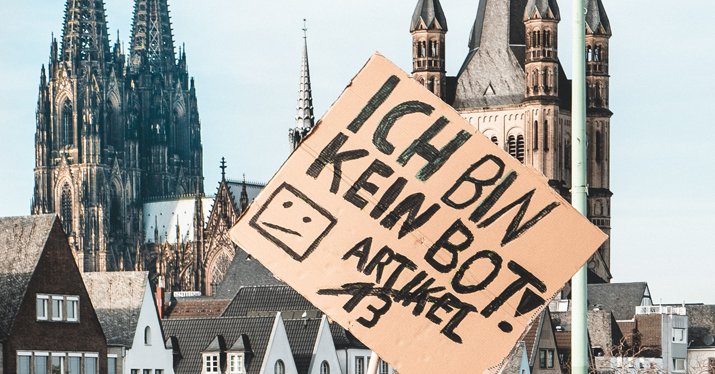“Error-prone filter algorithms and levies on links threaten to destroy our internet and our right to the digital freedom of expression,” says Dr. Patrick Breyer, lawyer and the German Pirate Party’s data protection expert. But that is exactly what the planned reform of EU copyright legislation will bring about. The free exchange of opinions and culture across online is set to be massively restricted. To prevent this, the petition platform change.org and the civil movement savetheinternet.info were calling for Europe-wide protests on 23 March 2019.
Article 13 will lead to upload filters
Following this legislative amendment, online platforms such as YouTube will be held directly accountable if users upload content that infringes copyright. Liability would then begin with the upload, not only after the platform has been notified of the infringement by the right holders.
Preventative recognition of suspected copyright infringements is thus required and will therefore inevitably lead to automated upload filters, even if the word itself is not explicitly mentioned in the text of the law. There is a risk that free, legal expression of opinion and creative work will also be blocked as a result, since automatic systems cannot always accurately distinguish between legitimate content and copyright infringements. Moreover, the safety measures provided do not suffice to prevent this. “We do not want a ’filternet’ or machine censorship,” claims Breyer.
Smaller platforms cannot meet the requirements
The existence of smaller platforms is threatened by the copyright reform, as many of them will be affected by Articles 11 and 13; or must at least fear to be. This is the case even where copyright infringements are currently no serious problem or when such platforms don’t have the resources to take said precautions.
Critics of the copyright reform support the rights of all creative folks and advocate modern copyright laws as well as the democratic regulation of market-dominating internet giants. However, they believe that the reform in its present version will do much more harm than good for the European people.
Upload filters mean automated censorship
With the Europe-wide protests, cross-party alliances call on the Members of the European Parliament to not agree to Articles 11 and 13. They also call on the federal government of Germany to abide by its coalition agreement, which explicitly rejects the use of upload filters for being inappropriate.
Also Jimmy Schulz (FDP), chairman of the Bundestag’s Digital Agenda Committee, spoke of copyright reform with great concern: “I share the fear of many citizens that these upload filters will lead to to automated censorship in the digital realm.” The parliamentarian warned,”They endanger our freedom of opinion and thus our democracy.”


Follow the comments: |
|
